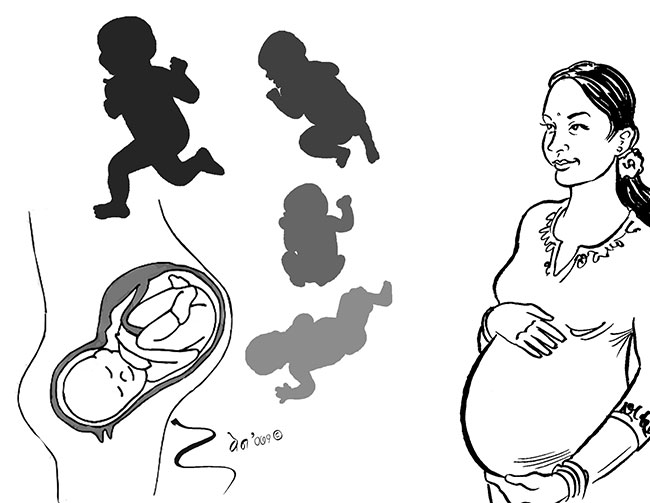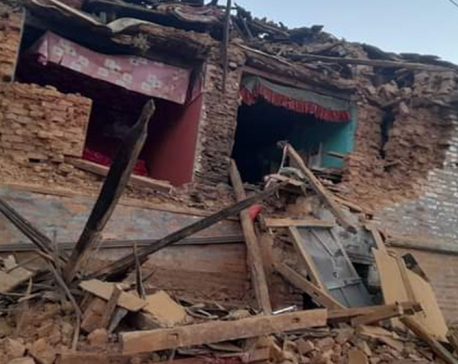
OR
More from Author
Abortion as a choice is in itself a pro-women step. But we have been unable to make it safe
There is an ongoing debate in the international arena on the personality of a fetus, a debate which has morphed into a larger “pro-choice” vs “pro-life” debate on abortion. In Nepal, abortion is recognized as pro-choice: as a privilege of pregnant women. According to our Country Code (2020), if an abortion is carried out by a qualified and registered health worker as per the procedures prescribed by the government, it shall not be deemed a criminal offense. Also, for the abortion of a fetus of up to 18 weeks that is the result of rape or incest, abortion can be carried out with the consent of the pregnant woman.
But abortion as a pro-life (the right of the child to live) is also recognized if a woman is above 12 weeks into her pregnancy. She is then not allowed to abort the child. The Country Code provisions that any person who commits abortion in this case shall be punished by jail term of one year in case the fetus is up to 12 weeks, three years in case the fetus is up to 25 weeks and five years in case the fetus is above 25 weeks.
Abortion medicines should be available free of cost if prescribed by authorized doctors.
In other cases, abortion was made legal or pro-choice with the 11th amendment of the Country Code in 2002. Moreover, in a society where women’s sexuality and reproductive rights were traditionally controlled by men, the new constitution, in a landmark step, guarantees woman’s right to safe motherhood and reproductive health as her fundamental right.
Many caveats
But is the pro-choice legal provision producing desirable results? The move from criminalization of abortion to its legalization is in itself a positive step but are we really aware of the concept of ‘my body, my right’ here in Nepal?
Abortion is a means of getting rid of unwanted pregnancy and usually done if parents are unable to bear the responsibility of a child, if the gap between the first child and other children is not as expected, if the economic status of the parents is unsound, or if the health of pregnant woman is not good. Many couples are also using it as a means of family planning, but that may create long-term health problems for women, even their death.

Our Country Code sets the age limit for marriage at 20 years for both men and women, with or without the consent of a guardian. One important reason for having age limit is that young women are not mentally and physically ready to give birth. According to the District Public Health Office in Kathmandu, in the year 2072/73, 16,000 women had abortions and 4,545 of them (30.10 percent) were under 20. Data shows that unmarried girls also come for abortion. This might bring serious problems for them as they may not be able to conceive in the future, and may even suffer long-term health problems including uterine cancer.
Safe abortion is the best method of abortion, and the criteria for it have also been clearly set in the Safe Abortion Service Process 2060. Yet there are also downsides to legalizing abortion and making the procedure safe. For instance, although it is illegal to determine the sex of fetus, many parents are still doing it, as they now have the option of aborting a female fetus.
According to a report in Republica, in this past fiscal in Dhanusa district, only 20 percent of total abortions there took place in its 20 authorized centers. Separately, says the Center for Research on Environment, Health and Population Activities (CREHPA), 42 percent abortions in Nepal are performed in authorized and government-permitted hospitals and health centers whereas 58 percent abortions take place in uncertified and unsafe places.
Mostly unsafe
Of the 323,094 abortions carried out in the past one year in Nepal, 137,000 were safe while 186,094 were unsafe. Since abortion is not done for free women in poor families often have to buy and consume abortion medicines illegally. If such medicines are unavailable, they even resort to local herbs, or putting pressure on their stomach to abort, both of which are highly risky. Many of them would opt for safe abortion if it was cheap and readily available. Even in urban areas people hesitate to go to legal abortion facilities and instead resort to dangerous drugs, which can often result in excess bleeding and even death of women.
As reported in Republica again, in Bayalpata hospital in Achham district, in the first 10 months of this fiscal, 150 women were admitted with problem of over-bleeding from unsafe abortion. This was mostly due to the dangerous medicines they consumed. Local drug stores are not allowed to sell abortion medicines without official permission. But even with official permission, they cannot sell without medical examination of pregnant women. Yet this legal provision continues to be openly violated.
Abortion as pro-choice is in itself a pro-woman step, protecting and promoting the concept of reproductive right of women. But we have been unable to make abortion safe. To improve things, we must first have adequate number of comprehensive abortion care service centers and give willing woman easy access to them. Separate laws related to abortion are necessary because under existing provisions, abortion has been included in the chapter of ‘Homicide’ in the Country Code. This suggests we still attach moral value to abortion rather than treating it in strict legal terms.
This is why it is important to raise awareness on safe abortion, and the media can play a vital role on this. There is also a need to develop an adequate number of trained nurses, health assistants and district level doctors to conduct abortion procedures. Moreover, the drug stores should be allowed to sell abortion medicines, provided that they are also closely monitored. It is even better if the government makes abortion medicines free if prescribed by authorized doctors.
The provision of legal abortion will improve the lives of women only if unsafe abortions can be checked and the stigma attached to it reduced.
The author is assistant professor at Kathmandu School of Law
You May Like This

Evidence-Based Policy Making in Nepal: Challenges and the Way Forward
“Life and health can never be exchanged for other benefits within the society.” With this vision, the Swedish Parliament in... Read More...

Nepal's Seismic Struggle and Ongoing Recovery Dynamics
Nepal's seismic vulnerability is highlighted by its history of frequent and devastating earthquakes. Over the past 52 years, from 1970... Read More...

Equality under the Law: Examining Legal Principles across Different Scales
The suspension of Nepali Congress (NC) MP Tek Prasad Gurung, who was found guilty on corruption charges, has confirmed that... Read More...

Just In
- World Malaria Day: Foreign returnees more susceptible to the vector-borne disease
- MoEST seeks EC’s help in identifying teachers linked to political parties
- 70 community and national forests affected by fire in Parbat till Wednesday
- NEPSE loses 3.24 points, while daily turnover inclines to Rs 2.36 billion
- Pak Embassy awards scholarships to 180 Nepali students
- President Paudel approves mobilization of army personnel for by-elections security
- Bhajang and Ilam by-elections: 69 polling stations classified as ‘highly sensitive’
- Karnali CM Kandel secures vote of confidence



















Leave A Comment